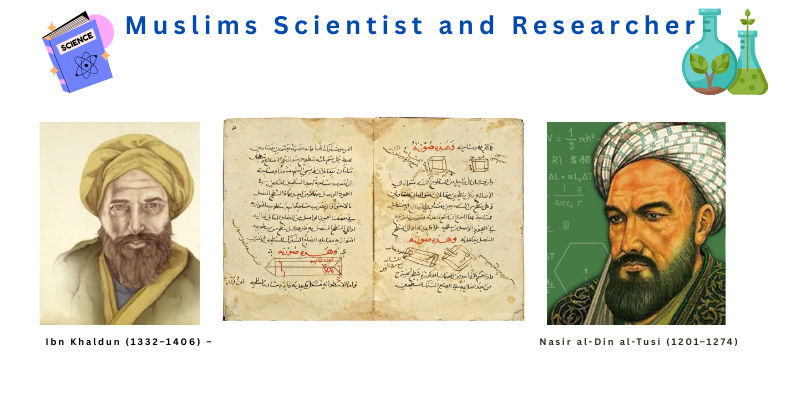Muslims scientists and researchers have shaped the progress of human civilization for over a thousand years. From the early Islamic Golden Age to the modern era, they have made remarkable contributions in mathematics, astronomy, chemistry, medicine, engineering, and technology. Their discoveries continue to inspire today’s researchers, proving that knowledge knows no boundaries of religion or geography.
In this article, we will explore the journey of Muslims scientists and researchers—highlighting their historical achievements, modern-day contributions, and the role they play in shaping the future of science and innovation.Here the 5- muslims scientist described.
In this article we also reply those who target to muslims as Abdulpuncharwala. They not focus the achiement of muslims in the history and other feild.Not only muslims scientist other field are full with the achievment of muslims intelactuals like as pliticians and historians and researches and many teachers and many high level thinker ,many innovator and many soofis and Islamic scholors. In the past if we seen then e find a very high thinker high valuable massenger like “Maulana jalaluddin Roomi’ are found in my land which word are so impressive and turning words of life and so on.
Table of Contents
Introduction: Muslims Scientists and Researchers
The Holy Qur’an encourages reflection, observation, and the pursuit of knowledge. Inspired by this, early Muslim scholars translated ancient Greek, Indian, and Persian texts, preserved them, and expanded upon them with original research. Their discoveries later influenced the European Renaissance and laid the foundation for modern science.
Today, Muslims researchers across the world are working in fields such as biotechnology, artificial intelligence, space exploration, and medicine. Their work continues to prove that curiosity and innovation remain central to the Islamic intellectual tradition.
Muslims Scientists in the Islamic Golden Age
The Islamic Golden Age (8th–14th centuries) was a period when Muslim scientists led the world in knowledge and discovery. Baghdad’s House of Wisdom (Bayt al-Hikmah) became a hub of research where scholars translated texts and conducted groundbreaking studies.
Key Figures of the Golden Age of Muslims scientist
Al-Khwarizmi is the top muslims scientist (780–850) – Known as the “Father of Algebra,” he introduced algorithms that are the backbone of modern computer science.
Ibn Sina (Avicenna) (980–1037) – His book The Canon of Medicine served as the main medical textbook in Europe for centuries.
Al-Razi (Rhazes) (865–925) – A pioneer in pediatrics and ophthalmology, he wrote extensively about smallpox and measles.
Ibn al-Haytham (965–1040) – Called the “Father of Optics,” he developed the scientific method and theories of light and vision.
Al-Biruni (973–1050) – Excelled in astronomy, physics, and geography, accurately measuring the Earth’s circumference.
These Muslim researchers not only preserved knowledge but also advanced it, setting a standard for future scientists.
Muslims Researchers in the Medieval Period
After the decline of Baghdad, Muslim research centers grew in Spain (Andalusia), the Ottoman Empire, and India.
Nasir al-Din al-Tusi (1201–1274) – Revolutionized astronomy with new models of planetary motion.
Ibn Khaldun (1332–1406) – A sociologist and historian, known as the “Father of Social Sciences.”
Taqi al-Din (1526–1585) – Built one of the world’s earliest observatories in Istanbul and studied celestial mechanics.
These researchers kept the flame of knowledge alive during times of political turmoil.

Modern Muslims Scientists and Researchers (1900–2000)
In the 20th century, Muslims entered new scientific fields such as nuclear physics, chemistry, and medicine.
Notable Scientists
- Dr. Abdus Salam (1926–1996) – Pakistani physicist and Nobel Prize winner for his work in electroweak theory.
- Ahmed Zewail (1946–2016) – Egyptian-American chemist awarded the Nobel Prize for femtochemistry.
- Ali Javan (1926–2016) – Iranian physicist who invented the first gas laser.
- Prof. Oktay Sinanoğlu (1935–2015) – A Turkish researcher in quantum chemistry.
These scientists proved that Muslim researchers could compete and excel at the global stage.
Contemporary Muslim Researchers (2000–2025)
In the 21st century, Muslims researchers are contributing to cutting-edge fields such as AI, renewable energy, genetics, and space exploration.
Leading Names Today
- Dr. Hayat Sindi (Saudi Arabia) – A leading biotechnologist and advocate for women in science.
- Dr. Rana Dajani (Jordan) – A molecular biologist recognized for her work in genetics and education.
- Hazzaa Al Mansoori (UAE) – The first Emirati astronaut who flew to space in 2019.
- Dr. Maryam Mirzakhani (Iran, 1977–2017) – The first Muslim woman and Iranian mathematician to win the Fields Medal.
- Dr. Farouk El-Baz (Egypt) – NASA scientist who contributed to the Apollo lunar missions.
Their work demonstrates how Muslim researchers are shaping the modern world with innovation and dedication.
Conclusion
From Al-Khwarizmi’s algorithms in the 9th century to Abdus Salam’s Nobel Prize in physics and the modern Muslim astronauts exploring space, the journey of Muslim scientists and researchers is inspiring and profound.
Their dedication shows that science is a universal language of progress. By supporting education, funding, and innovation, the Muslim world can produce even more researchers who will solve global challenges and inspire future generations.
Who is the father of Algebra ?
Ans-Al-Khwarizmi.
Who is Father of Optics of the worlds ?
Ans-Ibn al-Haytham.
Who is theFather of Social Sciences ?
Ans-Ibn Khaldun (1332–1406).
Hello , this is Aftab Alam of Auther of this content . The reasion behind of this website building is the “ABDULPUNCHARWALA”. The story behind this Articles and blog website to expos that muslim scientist and scholor who achiev a position in the feild of science technology and politics and other also.
